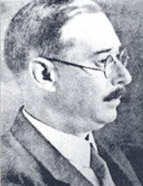

In a ‘humble little house with a door and windows overlooking Travessa do Mato’ (OC, 1992, p. 483), he was born in the city that was growing towards the river and sea labour. His father, Manuel José de Carvalho, a railwayman, son of apothecaries from Cem Soldos (Tomar), later established as a wine merchant, was ‘very intelligent, sensible and prudent, and despite having little education, very interested in cultural matters, especially history and literature’ ( Miscelânea [Miscellaneous] , 1963, p.899). His mother, the linewoman Ana Ferreira dos Santos, also came from Marrano roots in Campos do Mondego.
Learning to read with his aunt, a schoolmaster and pious Catholic, he grew up in liberal and republican circles and enrolled at the Figueirense Secondary School , a school for the wealthy bourgeoisie, recently created by an advocate of the new school , Fröbel ’ s open spaces and self-government , Mendes Pinheiro ( Sílvio Lima, um místico da razão crítica (da incondicionalidade do amor intellectualis [Silvio Lima, a mystic of critical reason (of the unconditionality of love intellectualis)]) , 2009).
In Coimbra, a useful and long encounter with Unamuno marked his meteoric turnaround: he graduated in Law (1914) and took the first degree in Philosophy at the new School, whose exceptional classification (1915) endorsed his doctorate (1917). In 1916, Alves dos Santos (a pioneer in Experimental Psychology) and Mendes dos Remédios, a historian of the Jews who revealed the country ’ s ‘history of intolerance’ ( Biblos , I, 1925), sponsored him to teach Morals, History of Ancient Philosophy and History of Modern Philosophy.
A believer in virtù , the highest value in the citizenship of humanities , a firm republican before and after the revolution hit the streets, a scholar of the shaping of republican ideology in the 19 th century, his essential philosophical foundation swung between Rousseau and Kant. In 1919, he evaluated th is double attraction: ‘One impulsive, which dragged me towards the most ardent Jacobinism; the other contemplative, for which I isolated myself in my room working deliriously’ ( A minha resposta [My response] ). In the meditative vis , in the study that Idealism provide d and in the Kulturkampf [Culture War] , he decisively overcame Jacobinism without breaking the civic protest against the Kingdom of Stupidity , as A. Sérgio ( V. ) called it when he reread an old text from 1818, (re)instated after 1926.
This work is financed by national funds through FCT - Foundation for Science and Technology, I.P, in the scope of the projects UIDB/04311/2020 and UIDP/04311/2020.
